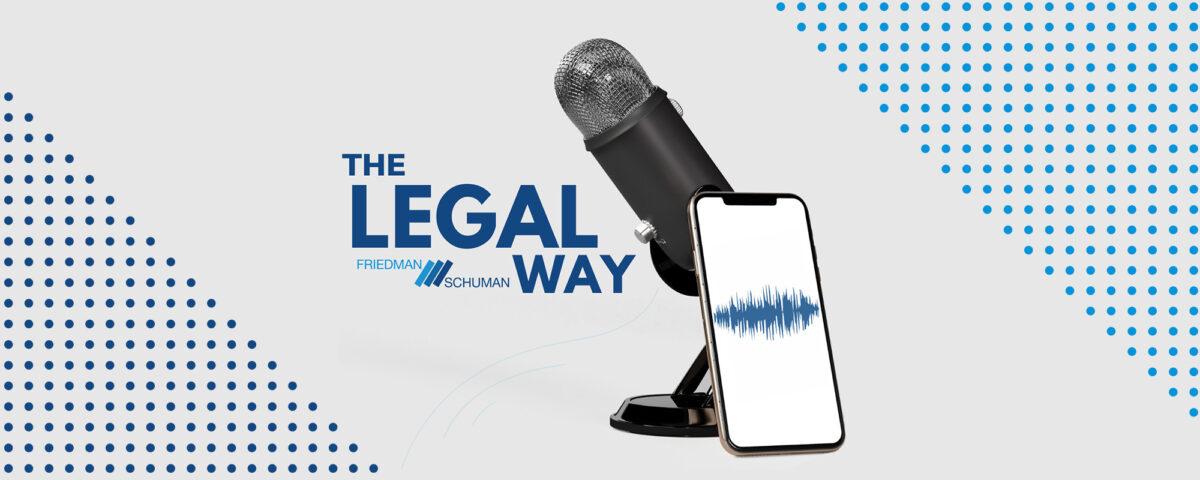
In today’s episode, join The Legal Way and Friedman Schuman personal injury attorney, Robert Nemeroff, as we embark on a riveting journey through a real-life personal injury case, unraveled step by step. Join us as we explore the complexities of an accident involving an Instacart delivery, and the insurance challenges that ensued. From the initial incident to the legal intricacies of liability and compensation, this episode offers a comprehensive look at a compelling case that sheds light on the intricate intersection of personal injury law and the gig economy. Stay tuned for expert insights and valuable takeaways that can help you navigate similar legal situations.
Episode Transcript:
Alyson: Hi everyone and welcome to the Legal Way podcast by Friedman Schuman. My name is Alyson Layser and I am your host. I am also the Director of Marketing here at Friedman Schuman. And today we are going to be joined by a guest, one of our attorneys, Bob Nemeroff, and we’re going to be diving into a little bit of personal injury here today and chatting about a recent case that Bob has been working on. So, before we dive into it, I’m going to let Bob introduce himself and then we will dive right in. So, Bob, introduce yourself.
Bob: Thank you very much. As you heard, my name is Bob Nemeroff. I am a shareholder here at Friedman Schuman. Our offices are in Fort Washington and Philadelphia. And I am a personal injury lawyer, meaning I represent individuals who have sustained injuries in various types of accidents, including automobile accidents. And I’ve been involved in a case that I will say is rather unique for me in that it’s the first time I have been confronted with the issues that have arisen in this case, primarily because the case involved a driver for Instacart. And I’m sure many of you are familiar with Instacart, one of the many food delivery services in this digital age that makes our lives a little bit easier when we are ordering takeout or we are doing food shopping and want those items delivered personally to our homes. And there are some lessons that I will share with you, lessons that I’ve learned and I those issues that have arisen in this case. As I said, one of the defendants in this case is Instacart, which is a trade name. There’s actually a corporate name, which for our purposes today is not terribly important, but suffice it to say that one of the defendants in the case is Instacart. And what happened was, my client was operating his car at an intersection when he was struck fairly violently by another car that was being operated by an Instacart driver. And the individual who was operating the car for Instacart had car insurance because she was operating her own vehicle, which is very common in these cases or these situations where an individual is making deliveries for a company like Instacart. I was able to obtain a form or a sample of the contract that Instacart requires its drivers to sign, which makes those drivers essentially—and I’ll use a legal term—an independent contractor. What that means is that the Instacart driver is not an employee of Instacart. That person is operating her own vehicle with her own insurance even though she’s making a delivery on behalf of Instacart. And that has a lot of legal significance because it might become difficult to hold Instacart liable, responsible for the accident, where the driver is essentially independent from Instacart as a company. One of the provisions or requirements in the contract between the driver and Instacart is that the driver purchase and maintain insurance on the car that she’s operating. And this is where the trouble arose. The vehicle which struck my client was insured. And the problem was that the insurance did not cover the driver when she was using her vehicle for commercial purposes. The insurance, in other words, covered her when she was using the vehicle for her own personal purposes, but not when she was driving the vehicle for Instacart. And she was not made aware that she had to modify her automobile insurance in that way before this accident occurred. So, she was out there driving her car, making a delivery for Instacart, when she caused the accident. And my client…sustained some very serious injuries as a result of the accident. The lesson from this is if you are considering or in fact working for one of these companies like Instacart and you’re using your own vehicle and you know that you have to have insurance on that vehicle, you must make sure that your insurance for your vehicle is modified so that you are covered during those times when you’re operating your vehicle for commercial purposes. Now, you may say, well, what effect did that have on my client? He is now unable to make a recovery against the individual driver, the Instacart driver, against her insurance company, because her insurance company denied the claim on the basis that she was operating her vehicle for commercial purposes and didn’t have that type of coverage. So, we are pursuing a claim against Instacart on a unique theory—and I say unique because I’m not sure if it’s been tested yet—but the theory is that if Instacart is going to insist upon their drivers being independent and insist upon their drivers using their own vehicles and procuring their own car insurance, they have a duty to inform—those drivers that they have to modify their personal insurance to cover them when they’re operating their vehicle for Instacart for commercial purposes. And that’s really the duty we will argue extends to my client, a third party in this case, because he’s at risk. If an Instacart driver causes an accident and is not properly insured and the company, at all informed the driver of this need to modify her insurance so that she’s covered when she’s operating her car for Instacart. So, it’s a rather unique situation that would not have occurred before this digital age. But that’s what we are dealing with right now. And the case is not yet resolved. We’re optimistic that it will be resolved favorably to our client. But the real takeaway, as I said, is if you’re a driver for Instacart or you’re considering becoming a driver for Instacart or DoorDash or one of these other companies and they require you to use your vehicle, make sure your vehicle is insured for commercial purposes before you start operating that vehicle on behalf of the company. And if you are the unfortunate victim, like my client of a car accident involving an Instacart driver. Just hope that the Instacart driver has heeded that advice and obtained appropriate commercial insurance for the vehicle before the accident occurred.
Alyson: Absolutely. When you first chatted with me about this case, I thought it was so interesting because that was not something that I had ever thought about. And I know a lot of people that do Instacart or door dash or what have you, and I had never thought about they are using their own vehicles, they have to make sure that their insurance works hand in hand with this side hustle of Instacart or whatever that they are doing, and I feel like this is something that a lot of people just are not aware of. And so, I would have to say, too, a takeaway would be to read the fine print and make sure that you have everything that you need before starting one of these side hustles that have become very popular nowadays.
Bob: Well, you are in good company because I was not aware of this issue before this case. And I only became aware of this issue as a result of carefully reading the Instacart contract wherein it describes their drivers as independent contractors. And by the way, the contract itself doesn’t get that specific.
Alyson: Interesting.
Bob: The contract itself does not specifically state, make sure that if you’re operating a personal vehicle that you have appropriate commercial coverage. But it’s a very simple matter of just calling up your car insurance company and informing them that I have taken a job with Instacart or DoorDash or one of these companies, similar companies, and explaining to them, I need to make sure that I have appropriate coverage for my vehicle when I’m operating it for this business purpose. And the insurance companies have that coverage, and they’ll modify your insurance appropriately so that you’re appropriately covered.
Alyson: Well, that’s good to know because I’m sure a lot of people listening who might be in a similar situation might be thinking, well, what in the world am I supposed to do? How will this affect my insurance? So, it’s nice to hear that a simple phone call could hopefully be able to get that modified.
Bob: Absolutely.
Alyson: That’s great. And question for you, you know, as more and more people are turning to different side hustles in this gig economy, like we were talking about earlier, like Instacart or UberEats, et cetera. Do you anticipate maybe seeing a rise in cases like this as these jobs become more popular?
Bob: Well, we’re already seeing it. One of the things that I did as part of my investigation was to pull the complaints from many of the cases that have been filed against Instacart over the last several years. And there were quite a few. So, it’s happening. I’m sure it’s on the rise as these companies become more prevalent and more people are using them. And of course, the more technology becomes a bigger part of our lives, the more or the greater number of legal issues usually arise from that technology. And the technology usually outpaces the change in the law. It’s always a game of catch up where the law tends to have to catch up to the advancements in technology. In this case, obviously, the technology had to occur before there could be these issues.
Alyson: Yes, that is true.
Bob: Yeah, it’s on the rise. It’s on the rise. That’s why I recommend to everybody who’s considering doing this kind of work to be mindful of these insurance issues.
Alyson: Yeah, absolutely. Well, I don’t want to take up too much more of your time. So, before we wrap up, is there anything else that you would like to share on this topic or anything else that you have kind of learned since handling this case that maybe other people should know?
Bob: Well, it’s a, in terms of an injury case, it is a motor vehicle accident case, just like any other injury case involving a motor vehicle. And the real unique aspect to this type of motor vehicle accident case are the insurance issues that arise from it. So that’s really the sum and substance of the message that I wanted to deliver as a result of my involvement in this case.
Alyson: Great. Well, this has been super interesting and very valuable. I know that a lot of people who currently are working with Instacart and similar companies will find a lot of value from everything that you shared and will be sure to call their car insurance. So, thanks again, Bob, for joining us and we’ll see you again soon.
Bob: My pleasure. Thank you for taking the time.
*PLEASE NOTE THAT NO MATTER DISCUSSED IN THE LEGAL WAY PODCAST SHOULD BE CONSIDERED LEGAL ADVICE. IF YOU DO REQUIRE LEGAL ADVICE OR REPRESENTATION, CONTACT AN EXPERIENCED ATTORNEY TO ASSIST YOU WITH YOUR LEGAL MATTER.




